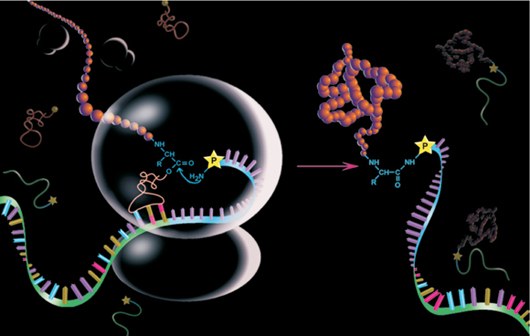Proteomics is a powerful, rapidly advancing field that enables the analysis (involves the identification of protein structure and function) of a total set of proteins within cells or tissues. Since proteins are the functional units within cells, it helps in elucidation of pathological and drug developments at the molecular level. Genomics and metabolomics are the appurtenant pump that are to be routinely applied throughout the drug-development process as well as after a product enters the market.
However, despite its enormous potential, proteomics technologies have not been moved yet from the bench scale into the clinics. One of the main reasons behind this reality is the laborious series of delicate, high cost equipment and complex steps in the analysis workflow, which are still waiting to being reduced into the routine practice. These critical steps include:
- Protein identification and differential proteomics (LTQ Orbitrap)
- Mass determination (LC/MSD time-of-flight)
- Peptide synthesis (Apex 396, CEM Liberty)
- Protein purification (ÄKTAexplorer-100 FPLC)
- Electrophoresis (Bio-Rad GS-800 densitometer, Bio-Rad Molecular Imager FX,Protein Simple Fluor-Chem M, Bio-Rad PD Quest software for 2-D gel analysis)
- Nano-fluidic immunoassay (Protein Simple CB1000), sophisticated sample preparation and pre-fractionation, on-line separation, multi-analyte outputs as well as data mining.
In India, the bottlenecks in the proteomic assay in clinics can be overcome plausibly by implementing PPP (Public-Private-Partnership) model based health sector by developing and testing on-line high-throughput technology for rapid qualitative and quantitative characterization of proteins in a biological sample. These activities must be divided into technology-oriented improvements in the currently used approaches and developments of new analytical methods and/or protocols.
Toward a goal of improving patient care, the facility must conducts research in the areas of mass spectrometry-based differential proteomics, peptide synthesis, protein and peptide purification, and protein identification, characterization and expression.
Major area of exploitation of proteomics assay in Indian clinics may include:
![]() A targeted proteome-based in vitro fertilization (IVF) of embryos
A targeted proteome-based in vitro fertilization (IVF) of embryos
![]() Development and Validation of Reverse Phase Protein Microarrays for Personalized Therapy
Development and Validation of Reverse Phase Protein Microarrays for Personalized Therapy
![]() Imaging Mass Spectrometry for Predictive and Prognostic Medicine
Imaging Mass Spectrometry for Predictive and Prognostic Medicine
![]() Immunomic Based Profiling for Early Cancer Detection
Immunomic Based Profiling for Early Cancer Detection
![]() Antibody Arrays for Clinical Applications
Antibody Arrays for Clinical Applications
![]() Autoantibody profiling for Cancer Detection
Autoantibody profiling for Cancer Detection
![]() Development and validation of a protein based signature for ovarian cancer detection
Development and validation of a protein based signature for ovarian cancer detection
![]() Analytical considerations for Mass Spectrometry Profiling in Serum Biomarker Discovery
Analytical considerations for Mass Spectrometry Profiling in Serum Biomarker Discovery
![]() Salivary Biomarkers for Clinical Applications
Salivary Biomarkers for Clinical Applications
![]() Proteomics of Caveolea: Clinical Applications
Proteomics of Caveolea: Clinical Applications
![]() Clinical opportunities for renal cell cancer management using proteomics
Clinical opportunities for renal cell cancer management using proteomics
![]() Cardiovascular Proteomics: implications for clinical applications
Cardiovascular Proteomics: implications for clinical applications
![]() Clinical Proteomic Applications from FFPE
Clinical Proteomic Applications from FFPE
![]() Development of high throughput mass spectrometry based approaches for cancer biomarker discovery
Development of high throughput mass spectrometry based approaches for cancer biomarker discovery
![]() Proteomics and Diabetic Retinopathy.
Proteomics and Diabetic Retinopathy.
